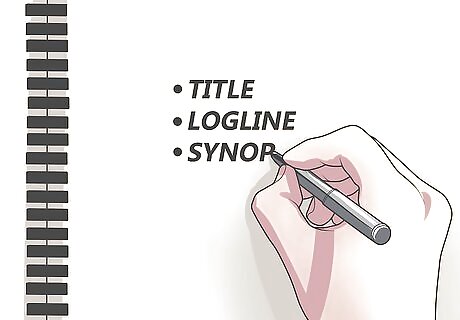
views
Choose a category.

Identify the category of reality series you want to create. This may be a "Docu-Style" series that shows viewers a unique world, family, lifestyle or business. Or it may be a competition series with a structured format, leading to an ultimate winner or specific result.
Create a unique "hook" for your show.

The hook is the unique premise and agenda that fuels the events in the series. It should also fuel the ultimate result that we witness.
Dream up a captivating title.

Create a title that supports the core concept. A title should be clever, clear, have impact, and tell us what we're essentially watching.
Write a synopsis.

The focus of your synopsis will be different depending on the type of show you're pitching. For example, if you're creating a docu-series format, focus on describing the people involved and their relationships. You'll also want to describe the unique world the show takes place in and the potential events that will unfold. If you're creating a competition format, focus on writing a synopsis of the "arc" of the series that describes how the competition works and progresses over the course of the season. This may involve the elimination of contestants based on competition or choices by judges or other person, or it may involve points or votes awarded that lead to a single winner each episode or at season end.
Write a 1 to 4 page pitch.

Don't make your pitch too long or too short. Once you create and write your Title, Logline, and Synopsis, you should ideally have a very brief but impactful pitch between 1 and 4 pages.
Get proof of creation before pitching.

Prior to any exposure in the marketplace, get proof-of-creation by researching archival services for your pitch. This provides third party proof that you created this specific and unique expression of a TV format at a specific date and time.
Research potential producers.

Find production companies that produce similar shows within the same genre as yours. Never send your pitch unsolicited, but DO send a direct query requesting permission to submit your reality show pitch for their consideration.
Use TV industry websites to your advantage.

Use websites that producers use for scouting new TV show ideas and formats. Production companies scouting on websites like the TV Writers Vault are required to agree to a "Non Disclosure" agreement, and are tracked electronically by the database as they read your pitch. Although most companies do not take unsolicited pitches, it is still critical that you make efforts to find direct connections to development executives and producers at production companies. Some will take a pitch submission, and most will require you to sign a "Material Release Form" which acknowledges their role within the creative TV Industry and the fact that they may already be working on a similar or identical project, and therefore have the right to produce such.
Pitch in person.

When pitching producers in person, directly communicate the unique agenda of the show. Follow that with specific descriptions of what we're potentially seeing unfold in the show. But don't get bogged down in too much detail. You want to give the powerful highlights in very efficient beats. This may include the specific challenges, or ultimatums and contestants or subjects face.
Consult with an attorney before signing a deal.

When a production company is interested, they will propose an "Option Agreement" for your project. This gives the production company exclusive rights, for a limited time period (typically 12 months) to sell your TV show idea to a network. Be sure to consult with an Attorney before signing any deal. A standard production deal for a TV show idea should include an on-screen "Created by" credit, some form of production credit, a per-episode fee (usually a percentage of the show's per episode budget), and small percentage of the production company's profits. If you want to be a screenwriter, read screenplays online. You can visit simplyscripts.com or the BBC writer's room. Join Facebook groups to read other want-to-be screenwriters' work, swap work with other writers, and watch movies and television. Analyze the story's concept, structure, plotting, and role of various characters.




















Comments
0 comment